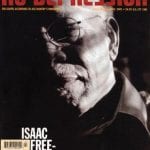Christy McWilson – The other side of midnight
The Picketts’ self-titled debut arrived in 1992, just in time to be overwhelmed by the craze for all things flannel and loud. “We were like wearing snowshoes and going through a blizzard. We had our head down and just kept going. It was really hard,” she says. “The grunge year was ’92, and that was the same year — I’ve said this before — both Nirvana and Garth Brooks [broke].
“Whereas in ’91 people thought, ‘Hey this is kinda cool, this is kinda old Burrito Brothers,’ they suddenly went, ‘My God, it’s Garth Brooks,’ and that was horrible,” she observes of country music’s new connotations. “But we kept playing. We stuck with it, and we were just the most unpopular band that ever lived.”
Not exactly. The Picketts persevered long enough to record two fine albums for Rounder, and to participate in the first (and so far only) No Depression tour, joining Hazeldine, Whiskeytown, and the Old 97’s. At last, she could tell that some things were changing.
“That was a great time. I still have fond memories of that. I’m definitely pro-woman, pro-female. That’s why I kind of liked that tour,” she says, referring to the presence of Hazeldine, which featured three women, and Whiskeytown fiddler Caitlin Cary.
“It was just nice, because I spend so much time always with guys. And I like guys. My band is men, but I really like it when women are given a chance to do stuff. We played in Seattle last [time] with three bands, and the main focus in all three of them was the female singer. I was having a heyday. I loved it.”
“I’m still plowing through the blizzard,” McWilson laughs softly, but her companions have changed along the way. Years ago, now, the Picketts finally parted company. “Two of us wanted to travel, and three of us wanted to stay in Seattle and just play locally,” she says.
“Blackie [Sleep] and I both wanted to continue; we were the songwriters, too. But he decided it was my thing, he didn’t want to write anymore. It was really hard for me to be on my own, because I so loved having him up there, because I’m shy, you know. And it was great, he deflected…it was kind of like Donny & Marie up there. But he didn’t think that he should be up there; otherwise it was sort of like the Picketts again, and I think ultimately he was right.” Blackie continues as the drummer in McWilson’s road band.
Some of Blackie’s role, at least in the studio, is played by another old friend, Dave Alvin, and they can’t even remember how they met. “When you’re talking about things that long ago, it’s almost like talking about a dream,” Alvin says. “I remember the first time she had a band, and they opened up for the Blasters at some club up there in Seattle. But then it turns out that there was all this connecting tissue.
“A few years later I went up to Seattle with Greg Leisz, and Scott and Christy had us over for this pre-gig party. It turns out that Christy was best friends with Greg Leisz’s younger sister when she grew up down here in Southern California, and one of her best friends from childhood ended up dating my brother. So it was just like, well, I guess we know each other pretty damn well.”
McWilson had sought to interest Alvin in producing the Picketts, but he demurred. However, toward the end of their run, the Picketts opened for Alvin and he approached her backstage: “‘Darlin’, when are we going to do a record?'” Christy remembers, deepening her voice. “I was shocked and really terrified, really shy. I wasn’t expecting that. That was a big honor. It still is.”
McCaughey and his R.E.M. cohort, Peter Buck, had mostly made a record with Christy that never came out. “That’s pretty interesting for what it turned out to be,” she says. “It had a drummer that was a lot different from the country drummer [on The Lucky One, Don Heffington].” Those sessions ended up as functioning as song demos for Alvin, inaugurating a collaborative process that has served both well for her two solo records.
“Each song is its own thing that I work on,” McWilson says. “I write ’em down and save ’em, and figure out the chords, and then I play ’em for Dave. And he decides what is happening and what isn’t.” And, often, he rearranges her songs.
“The title track of The Lucky One, she brought in as a Ray Price kind of country shuffle,” Alvin offers by way of example. “One listen to it, I realized it’s not a Ray Price country shuffle, it’s something else.
“Christy’s real prolific. She’ll come in with 30 songs. It’s like listening to a record: Some songs hit you right off the bat, and other songs take a few listenings. So you gravitate toward the ones that get you right off the bat, then a theme develops. I wouldn’t say I’m the sole guy that goes No, Yeah, No, but what I’ll do is I’ll say, OK, that’s real good, let’s start with this one. I’m listening for a lot of things. Besides hooks and all that, I’m listening for what would be fun to play, what would be fun to produce, what would hold up in the long run.”




